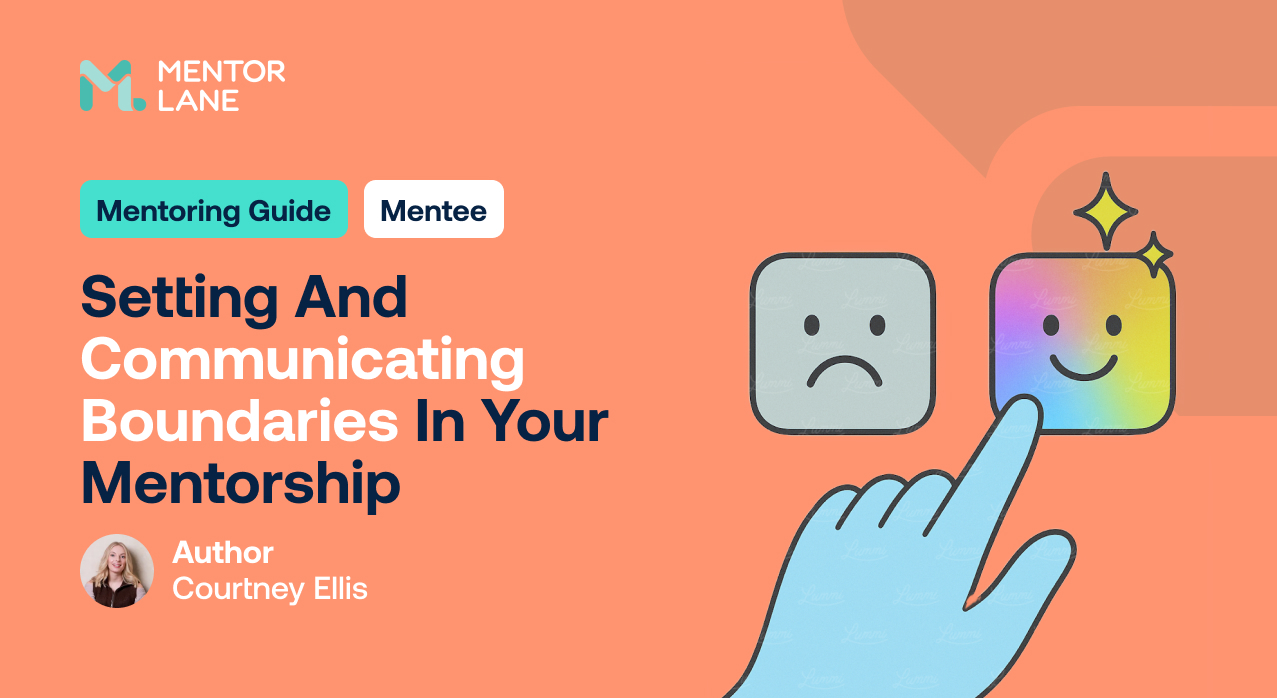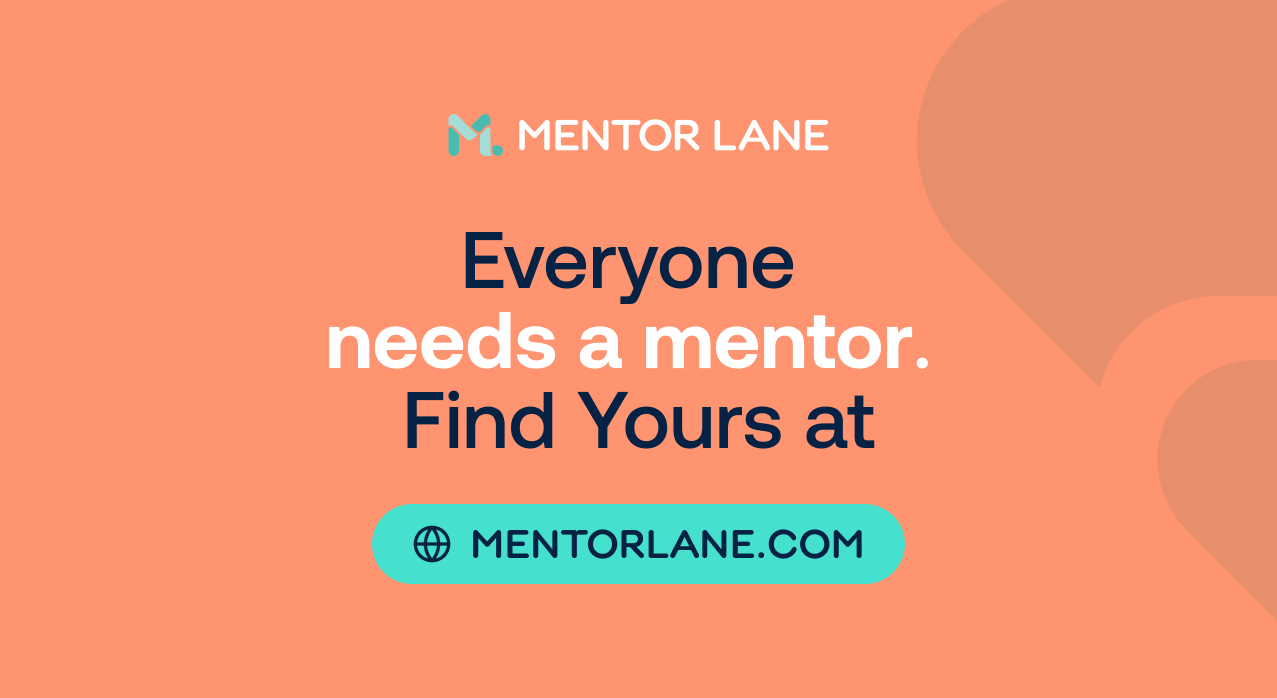News & Updates
25 Aug 13:02
8 min read
Setting and Communicating Boundaries in Your Mentorship
Learn how to set healthy boundaries in your mentorship. From communication guidelines to confidentiality, discover how clear limits create the perfect environment for growth.

Courtney Ellis
Media Manager

Setting and Communicating Boundaries in Your Mentorship
Download Worksheet - Setting Boundaries in Mentoring Guide for Mentees.pdf
A successful mentoring relationship often comes down to the ground rules that you set right at the start.
It's essential to clarify boundaries and limits you'd like to establish in your mentoring relationship. These aren't restrictive barriers that limit your relationship—they're a way for you to tell your mentor exactly how you'd like to work, and what is comfortable for you.
Setting boundaries doesn't need to be awkward. In fact, it can be a natural, straightforward conversation. You have every right to clarify your expectations, and this guide will provide you with the tools and confidence to establish healthy boundaries effectively.
When you set the right tone from the start, you create the perfect environment for a truly transformative mentoring experience.
Part 1: Set Basic Ground Rules Early
Your mentoring relationship needs ground rules before you talk about career goals or industry insights. Without this you’re building on shaky ground.
The most successful mentoring pairs make specific decisions together during their first or second meeting.
Essential Logistics to Decide Together
Meeting frequency and scheduling: How often will you meet? Every two weeks? Monthly? Every six weeks? Who takes responsibility for scheduling sessions? What happens when one of you needs to reschedule? Establish a clear protocol that prevents the slow drift towards sporadic contact.
Session structure and documentation: Will you use prepared agendas for each meeting? Who creates them? How will you document key insights, action items and progress? Will you share notes after each session or keep individual records?
Communication between sessions: What’s the preferred method for quick questions or updates? Email? Text? Professional messaging platforms? How quickly should you expect responses and what constitutes an urgent versus routine communication?
Behavioural Ground Rules That Prevent Drift
Beyond logistics you need explicit agreements about how you’ll show up for each other:
- No multitasking during meetings: Phones down, laptops closed unless specifically needed for the conversation. Full presence and attention.
- Open and honest communication: Commitment to share real challenges, setbacks and concerns rather than presenting a polished facade.
- Prepared participation: Both parties come with specific topics, questions or updates rather than hoping inspiration strikes during the conversation.
- Time boundaries: Start and end on time. If discussions need more time, schedule a follow-up rather than extending indefinitely.
- Closure reflection commitment: Agreement to have a formal evaluation session at the end of the mentoring period to review what worked and what could improve.
These rules help prevent problems like unclear expectations that cause frustration and ghosting (where someone slowly stops responding). They create a framework for real professional growth.
Part 2: Confidentiality
A breach of confidentiality can cause long-term emotional damage, loss of reputation and even legal consequences. Yet most mentoring pairs never explicitly discuss what stays private.
Don’t assume your mentor understands your privacy expectations. Different industries, personality types and cultural backgrounds have vastly different comfort levels with information sharing. What feels like helpful networking to your mentor might feel like a devastating breach of trust to you.
Confidentiality Checklist
Use this framework to explore confidentiality boundaries thoroughly:
What stays strictly between you:
- Personal struggles affecting your professional performance
- Specific conflicts with colleagues, managers or team members
- Salary negotiations, job search activities or career transition plans
- Company sensitive information you share for context
- Personal insecurities or professional fears you’re working to overcome
What can be shared and when:
- General professional development insights (without personal details)
- Industry trends or best practices learned through your discussions
- Success stories or breakthrough moments (with your explicit permission)
- Challenges common to your role or industry level (anonymised)
- Referrals or networking opportunities that could benefit you
What happens after the formal mentoring relationship ends:
- Does confidentiality extend indefinitely or have time limits?
- How do you handle references or recommendations that draw on your mentoring discussions?
- What about casual conversations at industry events or social gatherings?
- How should sensitive information be handled if you end up working at the same organisation?
Create simple agreements about external discussions. This conversation might feel awkward initially but it prevents devastating trust breaches that can damage both your professional reputation and your capacity for future mentoring relationships.
Remember: you can always expand sharing permissions later but you can never take back information that’s already been shared inappropriately.
Part 3: Personal Limits and Triggers
The most successful mentoring relationships have clear personal boundaries without being cold or distant. Failed relationships show poor communication and conflicts of interest when boundaries aren’t set early.
You need to know your boundary triggers before they become relationship damaging problems. Self awareness here prevents the need for difficult conversations later.
Personal Boundary Triggers
Time and availability violations:
- Consistent no-shows or last minute cancellations without notice
- Sessions that run over time without discussion
- Expectations for immediate response to non-urgent communications
- Pressure to meet outside normal business hours without reason
Inappropriate personal territory:
- Over sharing personal problems that go beyond professional impact
- Asking for advice on romantic relationships, family conflicts or personal finances
- Discussions that make you uncomfortable due to personal values or experiences
- Mentors who ask for personal information you’re not ready to share
Role and authority confusion:
- Mentors who overstep advisory role into management
- Trying to influence your decisions beyond providing perspective and guidance
- Pressure to follow specific career paths or make particular choices
- Using the mentoring relationship to advance their own career
Redirecting Conversations
Consider this scenario:
Luise, a marketing manager, starts discussing her recent divorce in detail with her mentor Jürgen during their monthly session. She shares intimate details about custody arrangements, financial settlements and her emotional struggles. Jürgen, a senior marketing director, feels out of his depth and uncomfortable that the conversation has gone way beyond his expertise or the scope of their professional mentoring relationship.
Rather than letting discomfort build or changing the subject abruptly, Jürgen responds:
"Luise, I can see this is a tough time for you personally and I appreciate you sharing this with me. I want to make sure you’re getting the right kind of support for what you’re going through. For our mentoring conversations I think I can be most helpful if we focus on how these life changes are impacting your professional goals and what strategies might help you keep your career momentum during this transition. Have you considered talking to a counselor or support group who can provide the personal guidance you need?"
This approach acknowledges the person’s trust, validates their experience, redirects to professional territory, suggests more suitable resources for personal support and maintains the relationship while protecting the boundaries.
When you find yourself sharing personal discussions that go beyond professional development, be prepared for this kind of redirection. As a mentee, you might also need to redirect conversations that make you uncomfortable:
"I appreciate your interest in my personal situation. I'd prefer to focus on how this impacts my professional growth and what strategies might help me navigate the workplace aspects."
Part 4: Stumbling Blocks
Smart mentees discuss potential relationship challenges during the initial boundary setting conversation. The mentoring pairs that last and thrive are the ones that anticipate obstacles rather than hoping they won’t appear.
Mentoring Pitfalls
Misunderstood goals and expectations:
- Mentee expects job placement; mentor focuses on skill development
- Mentor assumes mentee wants industry connections; mentee needs confidence building
- Different timelines for progress and achievement
- Unclear success metrics for the mentoring relationship
Communication breakdowns:
- Decreased frequency of contact without discussion
- Avoiding difficult conversations about challenges or setbacks
- Different communication styles causing misunderstandings
- Failing to address small irritations before they become major issues
Unspoken assumptions:
- Beliefs about time commitment, availability or priority level
- Different understanding of confidentiality or information sharing
- Assumptions about the mentor’s role in the mentee’s career decisions
- Expectations about relationship duration or natural conclusion points
Proactive Discussion Questions
Address these potential issues by talking about them directly:
“What stumbling blocks have you encountered in past mentoring relationships?”
Take time to:
- Discuss previous mentoring experiences
- What worked, what didn’t and what did you learn?
“What could affect this relationship internally or externally?”
Consider:
- Workload changes, role transitions or organisational restructuring
- Personal commitments like family changes, health issues or educational pursuits
- Industry changes that might shift priorities or focus areas
- Other professional relationships that might create conflicts or competing demands
“How do we recognise and resolve issues when they arise?”
Agree on:
- Regular relationship check-ins (quarterly or mid-point evaluations)
- To address concerns directly rather than letting them simmer
- Plans for how to change the relationship or end it smoothly if needed
Your Boundaries Are Your Safety Net
The mentees who set clear boundaries early create the conditions for real learning and growth.
But boundaries aren’t set-and-forget agreements. They’re living frameworks that need regular attention and adjustment.
As your professional situation changes, as your comfort level with your mentor grows and as external circumstances change your boundaries may need to be modified.
Schedule regular boundary check-ins – perhaps quarterly or at the midpoint of your formal mentoring period.
Ask yourself:
- Are our current meeting patterns still working for both of us?
- Have any confidentiality concerns or comfort levels changed?
- Are there new personal or professional factors we should consider?
Your boundaries are your safety net. They catch problems before they become relationship-ending conflicts. They create the trust and respect that allows for honest feedback, vulnerable sharing and real professional growth.
Review them regularly to adjust and improve how you work together. The investment in this framework pays dividends in the quality of guidance, support and development you’ll receive.
Your choice to set these boundaries determines whether you’re part of the minority of successful mentoring relationships or another statistic in the majority that fail to reach their potential.
Choose wisely. Your career depends on it.

This post is also available in:
Related Posts
Sales Mentors: A 9-Round Guide to Sales Success with Michael Silberberger
Discover Michael’s 9-round guide to sales success. Learn how sales mentors help you build confidence, resilience, and lasting results.
What to Expect from a Mentor: What My Millionaire Mentor Taught Me
Curious what a millionaire mentor actually teaches? It's not about money tricks, it's mindset. Discover the surprising lessons that transformed Michael's approach to success and life.
How To Become a Mentor in Germany
Ever thought about becoming a mentor? Click here to work out if you're ready to become a mentor, and the steps to take to become a mentor in Germany.



-cd972d86.png)
